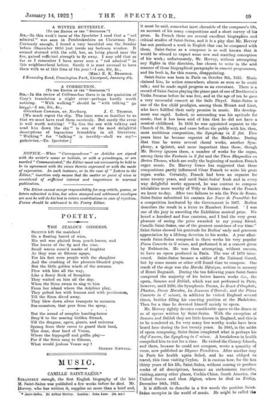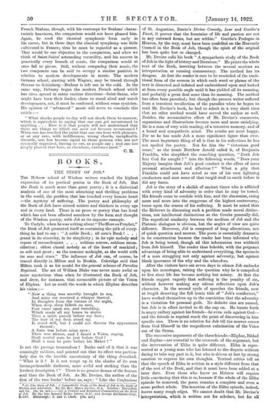M IT S I C .
CAMILLE SAINT-SAINS.*
STPaNGELY enough, the first English biography of the late M Saint-Salina was published a few weeks before he died. Mr. nervey, who has written it, supplies no more than a brief and,
• Saint-Sains. By Arthur Hervey. London : John lane. [Oa net.]
it must be said, somewhat inert chronicle of the composer's life, an account of his many compositions and a short survey of his prose. In French there are several excellent biographies and critical studies of Saint-Salina, and it is a pity that Mr. Hervey has not produced a work in English that can be compared with them. Saint-Satins as a composer is so well known that it would be absurd to expect some new and startling conception of his work ; unfortunately, Mr. Hervey, without attempting any flights in this direction, has chosen to write in the arid manner of those biographical paragraphs in concert programmes, and his book is, for this reason, disappointing.
Saint-Satins was born in Paris on October 9th, 1835. Music claimed him, he writes somewhere, almost as soon as he could talk ; and he made rapid progress as an executant. There is a record of Saint-Satins playing the piano part of one of Beethoven's Violin Sonatas before he was five, and at the age of ten he gave a very successful concert at the Salle Pleyel. Saint-Satins is one of the few child prodigies, among them Mozart and Liszt, who have fulfilled their early promise in music. His develop- ment was rapid. Indeed, so astounding was his aptitude for music, that it has been said of him that he did not have a musical childhood. In 1853 he was appointed organist to the Church of St. Merry, and came before the public with his, then, moat ambitious composition, the Symphony in E flat. Five years later he became organist of the Madeleine. During that time he wrote several choral works, another Sym- phony, a Quintet, and more important than these, though Mr. Hervey ignores them, a number of works for the organ, among them the Fantasia in E flat and the Three Rhapsodies, on Breton Themes, which are really the beginning of modern French organ music. Dr. Harvey Grace has suggested that these compositions partly influenced Cesar Franck to write his great organ works. Certainly, Franck had been an organist for some twenty years, and until Saint-Satins' fresh and in every way delightful works appeared, he was content to compose trivialities more worthy of Way or Batiste than of the Franck we know to-day. After two failures to win the Prix de Rome, Saint-Baena submitted his cantata Les NOCe8 de Promethez for a competition instituted by the Government in 1867. Berlioz describes the result in a letter to Humbert Ferrand. " I was one of the jury in awarding the Exhibition musical prize. We heard a hundred and four cantatas, and I had the very great pleasure of seeing the prize awarded to my young friend, Camille Saint-Satins, one of the greatest musicians of our time." Saint-Satins showed his gratitude for Berlioz' early and generous appreciation by a lifelong devotion to his works. A year after- wards Saint-Satins composed in three weeks his very popular Piano Concerto in G minor, and performed it at a concert given by Rubinstein. He was then attempting, without success, to have an opera produced in Paris. The war of 1870 inter- vened. Saint-Satins became a soldier of the National Guard, but by some means or other still found time to compose. One result of the siege was the Marche Heroique, written in memory of Henri Regnault. During the ten following years Saint-Satins composed the majority of his better known works (i.e., the opera, Samson and Delilah, which was not performed in Paris, however, until 1890, the Symphonic Poems, Le Reuel d'Omphale, Phaeton, Douse Macabre, La Jeunesse d'Hercul3, and the Piano Concerto in C minor), in addition he visited England several times, besides filling his exacting position at the Madeleine. Then for a time he devoted himself mainly to opera.
Mr. Hervey rightly devotes considerable space to the dozen or so of operas written by Saint-Satins. With the exception of Samson and Delilah they are little known in England, and this is to be wondered at, for very many less worthy works have been heard here during the last twenty years. In 1885, in the midst of opera composing, Saint-Satins completed what is perhaps his chef d' ceuvre, the Sympiony in C minor. A breakdown in health compelled him to rest for a time. He visited the Canary Islands, and there, because he could not compose, wrote a quantity of verse, now published as Rhymes FamiliIres. After another stay in Paris his health again failed, and he was obliged to travel, this time visiting Ceylon. It is curious how, for the last thirty years of his life, Saint-Satins, without ceasing to produce works of all descriptions, became an enthusiastic traveller, visiting, among other places, Cochin-China, South America, the United Staten and then Algiers, where he died on Friday, December 16th, 1921.
It is difficult to describe in a few words the position Saint- Satins occupies in the world of music. He might be called the
French Brahma, though, with his 'contempt for Brahma' charac- teristic heaviness, the comparison would not have pleased him. Again, •he used the classical symphonic 'form early in his career, but in those days the classical symphony was little cultivated in France; thus he must be regarded as a pioneer.
That would be one objection to the comparison, and when we think 'of Saint-Satins' astounding versatility, and his success in practically every branch of music, the comparison would at once fall to pieces. 'Still, without comparing their music, the two composers can be said to occupy a similar position in relation to modern developments in music. The modem German school, starting with Wagner, may be traced through Strauss to Schonberg—Brahms is left out in the cold. In the same way, Debussy began the modern French school which has since spread in many curious directions—Saint-Saons, who might have been their leader, chose to stand aloof and watch developments, not, it must be confessed, without some cynicism. His opinion of " advanced " music will serve to conclude this article :- "What shocks people to-day will not shook them to-morrow, which is equivalent to saying that one can get accustomed to anything . . . How is it that people will not understand that there are things to which one must not become accustomed ? When one has reached the point that one can hear with pleasure, or at any rate, with indifference, wrong chords, inexplicable discords, one has become equal to those persons 'who are not musically organized, having no ear, as people say ; and one has simply proved that here, as elsewhere, extremes meet."
'C. H.



































 Previous page
Previous page